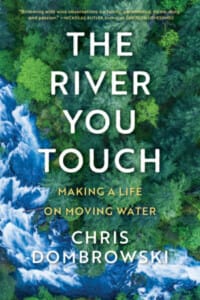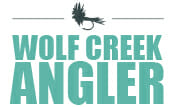
When I saw The River You Touch by Chris Dombrowski in the Angler’s Book Supply catalog and read the blurb I ordered a half a dozen copies thinking it might be something that we’d be able to sell here at Wolf Creek Angler. After all, the story of a Polack Michigan transplant sinking roots into the rocky soil of a new life in Montana is one that is near and dear to me. I was not familiar with Dombrowski’s work but had heard of him from an artist acquaintance who had spoken very highly of him both as a writer and an angler, putting him on my radar.
We sold through those first copies in fairly short order and I figured I’d grab the last one and check it out.
Having just finished the book after several starts and stops over several months (my usual book progress), I was surprisingly moved and left wanting more. I try to stay abreast of contemporary fishing/outdoor literature as well as the classics and I appreciate the genre but I’ve also read enough that things tend to blend together.
Dombrowski is certainly a wordsmith worthy of his accolades but beyond that, to read this book while having such a personal connection to the physical places providing the backdrop for the story as well as to the subject matter itself, really brings it home to me on a very personal level.
Obviously the world of Montana fly fishing is relatively small but even so, we’ve all traveled different routes to get here and arrived in markedly different destinations both geographically and vocationally. Dombrowski and Orzechowski share membership in the community called the Montana fly fishing industry but our paths have never crossed and we live in different worlds. Him in the outfitting/guide “on the water” world and me, while well ensconced in the outfitting world, spending much more time in the fly shop/retail world than on the water.
Still, we’ve both arrived to similar destinations by figuring out how to make a life mostly adjacent to, but sometimes directly overlapping, the soul soothing therapy of pursuing trout on a host of some of the most beautiful waters in in North America.
Reading in this book about familiar waters like the Blackfoot River and Rock Creek as well as places in and around Missoula, a city which has cast a spell over me since I’ve lived in Montana, is instantly relatable and while Michigan is not afforded the same level of adoration by Dombrowski, I could almost smell the decay and chill of fall and feel the drudgery of flat, cold, grey winter skies in the NW corner of my home state.
The River You Touch is a book about our connections to the places where we make our lives. From the book, “how it feels to be wedded to a place, to know a place not as a tourist but as an intimate, and the trauma caused when such ties are severed.”
More than a decade into my own story of carving out a life in Montana I share Dombrowski’s love of this place and while I do feel as though I am wedded to it I still look upon these landscapes with nothing short of awe. Perhaps not quite through the eyes of a tourist at this point but as one who continues to be amazed, inspired, captivated and humbled by the landscapes which called to me for so many years and eventually drew me westward.
The mountains, the streams, the valleys, the forests, the vast horizons, the cities…with very few exceptions most everywhere in Montana stirs my soul and gives me joy. I can’t imagine that ever not being the case.
And so Dombrowski’s story of making a life, of raising a family, of melding into the community fabric, all against the backdrop of making an unconventional living as fly fishing guide and a poet in a state with plenty of economic challenges, will strike a chord with many readers, especially those with ties to western Montana.
The River You Touch is a book I wish I had written and one the likes of which I hope I will one day write.
Our responses to the art we consume is so rooted in our own personal experiences and the mental connections we make where perception and art intersect in a moment in time and this book speaks to me in a plethora of ways it likely won’t to other readers based on common themes and places.
That being said, good writing strikes those chords in a totality that transcends personal experience. You don’t need to be a Michigander, a Montanan, a fly fishing guide or a writer to appreciate and savor the heartfelt story presented here, you need only be human.

Leave A Comment